Lipid nanoparticles are highly-advanced biotechnologies. Each lipid nanoparticle is designed to adsorb to cells inside the human body and reprogram them using mRNA.
Whether you are pro-vaccine, anti-vaccine, or don’t care what people do with their own bodies, we can all agree that the COVID-19 lockdowns were mentally and emotionally exhausting for everyone. We just wanted a quick-and-easy solution to ‘get back to normal.’
The COVID-19 vaccines were pitched as the ‘quick and simple’ solution so many of us desperately wanted. Pfizer explains how the COVID-19 mRNA vaccines were neither developed quickly, nor are they a simple solution.
COVID-19 mRNA Lipid Nanotechnology has been Around for Decades
“Though many people first became aware of mRNA technology because of COVID-19 vaccines, it is not new to the scientific community. For decades, scientists have studied mRNA, looking for ways to unlock its potential to prevent and treat disease. While the mechanism of action for mRNA technology is relatively simple—once inside cells, it instructs them to build proteins— The approval of the first mRNA-based COVID-19 vaccines was a scientific turning point, establishing mRNA as a versatile, flexible TECHNOLOGY.”

mRNA technology has been researched and developed for around 40 years but never passed the FDA’s safety and efficacy standards for human use; not until August 23 of last year. When the FDA approved Pfizer’s mRNA-based COVID-19 vaccine this was a turning point establishing mRNA as a technology; a technology that was approved as a vaccine.
The Kingston Report is a reader-supported publication. To receive new posts and support my work, consider becoming a free or paid subscriber.
Are the COVID-19 mRNA Vaccines a Biologic or a Technology Device?
COVID-19 mRNA vaccines contain lipid nanoparticles which are highly-advanced biotechnologies. The lipid nanoparticles are both delivery devices for penetration into cells and mRNA (editing software). The mRNA are the instructions or computer codes that program the lipid nanoparticles. The mRNA injections do not contain a biological virus or portion of a biological virus. There is truly nothing about Pfizer’s mRNA technology that meets the FDA’s definition of a vaccine.
COVID-19 mRNA injections deliver lipid nanoparticle technologydirectly into cells inside the human body. As you can see per Pfizer’s website, the mRNA are the instructions (codes) that the lipid nanoparticle technology uses to turn human cells into spike protein producing factories.
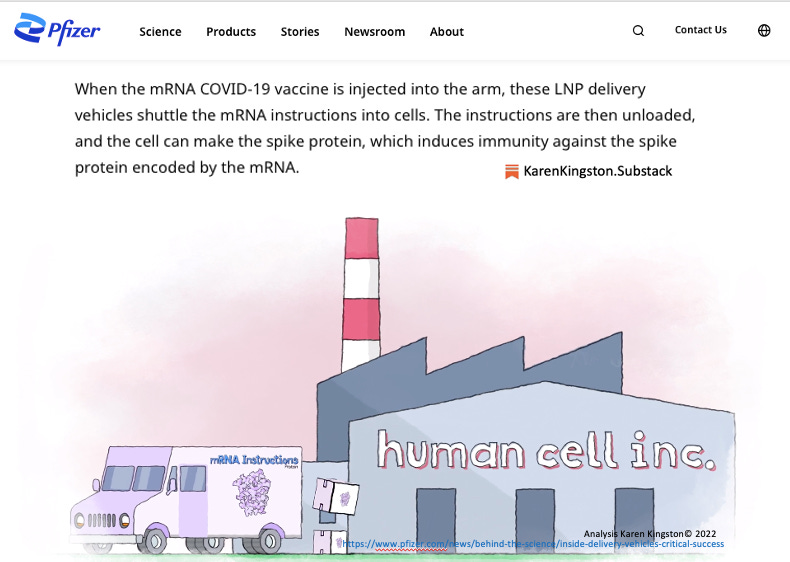
Not only can mRNA sequences (codes) instruct lipid nanoparticles to turn cells into spike protein producing the factories, the mRNA sequences can also be written to “Turn your body into medicine producing factories,” per Pfizer’s website.
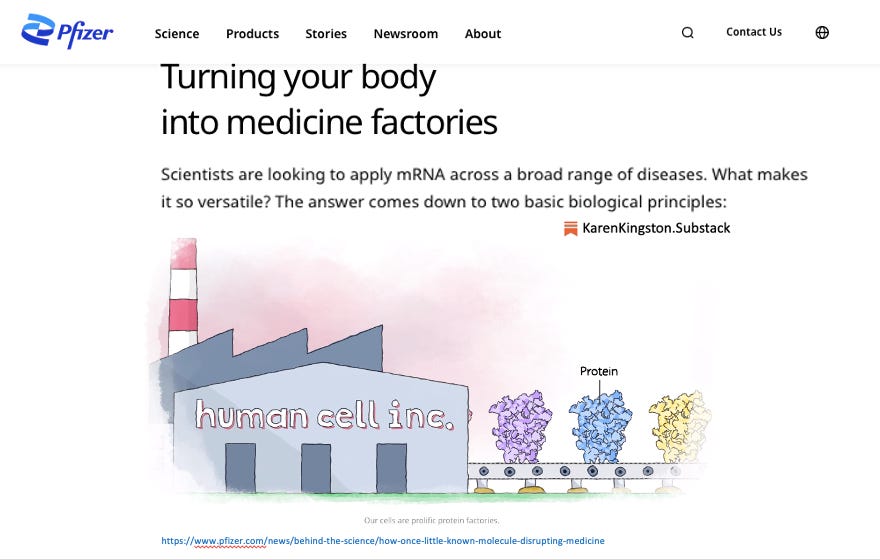
Moderna makes similar claims regarding mRNA turning the body into a drug production factory, stating ‘mRNA teaches the body to make its own medicine.’
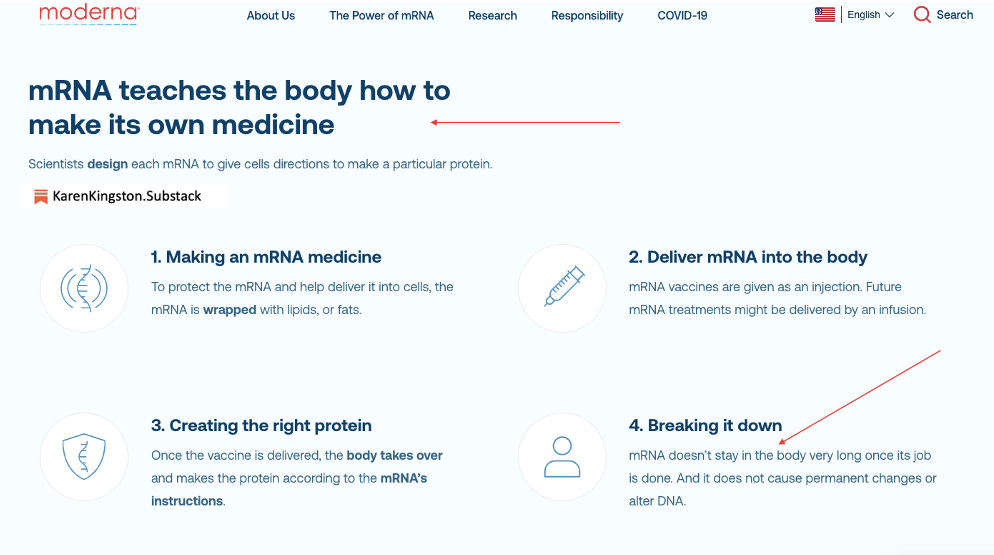
I don’t know of anyone who signed up to have their bodies turned into ‘medicine factories,’ ‘spike protein factories,’ or any other kind of factory for that matter. I think most folks thought they were getting a ‘vaccine’ that contained a synthetically recreated portion of a virus that would produce antibodies and then disappear from their bodies. No one signed up to have disease-causing spike protein factories installed in their bodies.
Pfizer States that the mRNA Doesn’t Stay in Your Body and Doesn’t Make Permanent Changes
Pfizer and Moderna both claim that the mRNA doesn’t stay in the body and doesn’t alter DNA. While these statements are not 100% false, they are misleading.
It’s the lipid nanoparticle (LNP) technology that stays in your body and alters your DNA. The mRNA just provides the instruction on how to alter DNA, but it’s the LNP that does the actual genetic editing inside of cells.
On October 7, 2021, Pfizer published an article entitled Shot of a Lifetime. The article discusses the urgent need for Pfizer to produce mass quantities of something called a ‘cationic lipid,’ for the mRNA vaccines. The cationic ‘lipid’ is one of four nanoparticles that make up the lipid nanoparticles in the COVID-19 mRNA injections.
Pfizer stated,“Without these lipid nanoparticles there could be no Pfizer-BioNTech mRNA vaccine.”
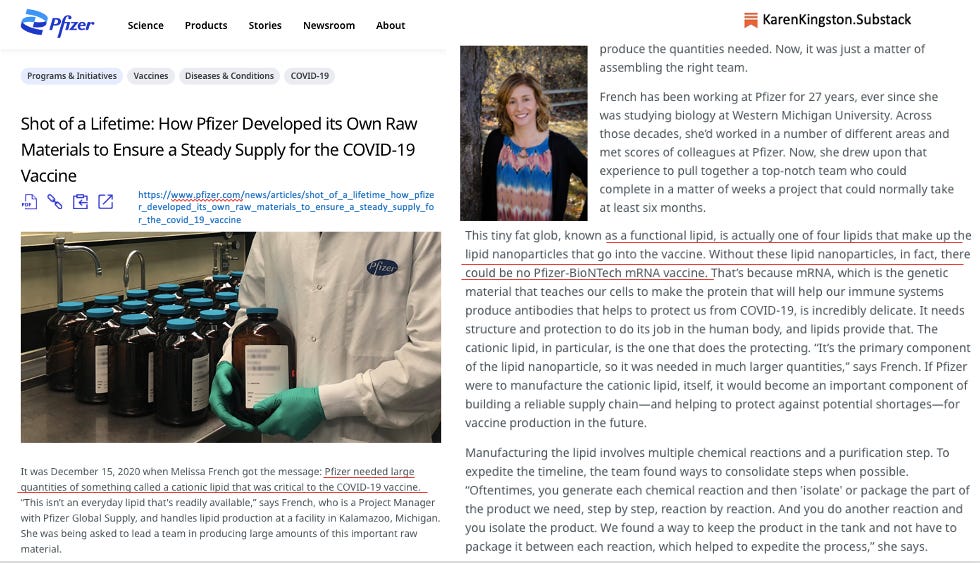
Per Pfizer’s article, “(the cationic lipid… known as a functional lipid, is actually one of four lipids that make up the lipid nanoparticles that go into the vaccine.”
Catioinic means that the ‘lipid’ hosts a positive electronic. There is no lipid in nature that can host an electronic charge.
The cationic lipid is not actually a ‘lipid.’ It’s a nanoparticle technology. It’s important to note that per Pfizer’s website, the cationic lipid is a biosynthetic nanoparticle that can host a positive charge, meaning it’s actually an electronic device, not a biologic. Vaccines are supposed to be comprised of biological substances, not electronic biosynthetic nanoparticle devices.
Why Would Pfizer Call Nanoparticle Technologies ‘Lipids’?
Pfizer refers to the biosynthetic nanoparticle technologies as ‘lipids’ because it sounds a lot less scary to be injected with lipids (which are natural biological substances found in the human body) than to be injected with nanoparticle technologies that were never approved for human-use before.
This is a 3D CGI image of the lipid nanoparticle technology that is used in the COVID-19 mRNA vaccines. (Image from C&EN, March 2020)
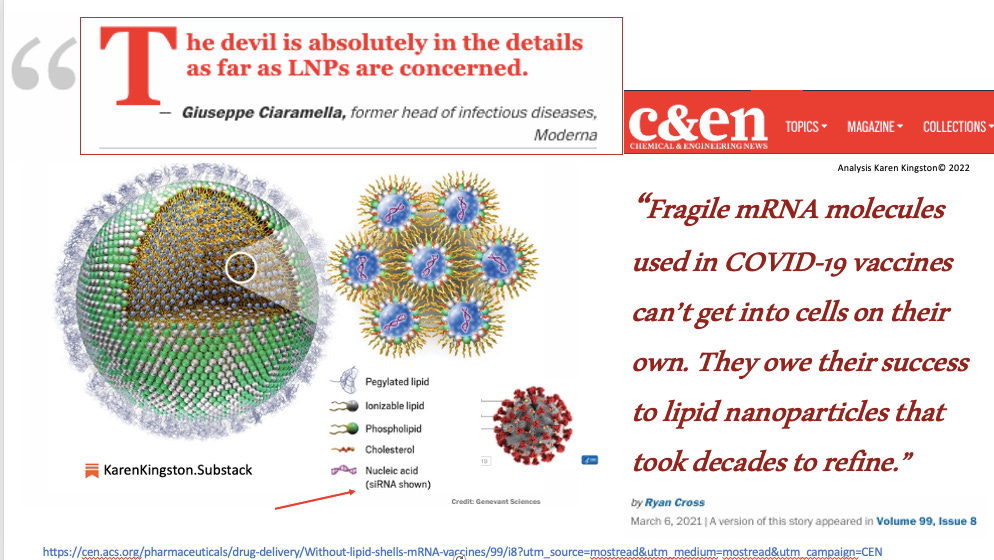
Below is the image of the lipid nanoparticle technology next to COMIRNATY’s listed ingredients (Pfizer mRNA vaccine) from page 7 of Pfizer’s FDA application.
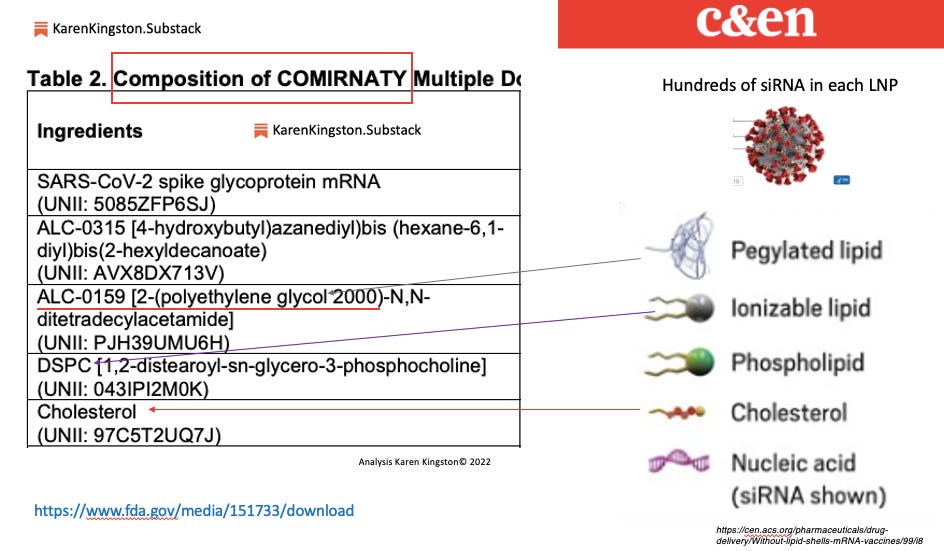
You can see in the above screenshot of ingredients that Pfizer’s COVID-19 mRNA injections contain the ionizable lipid DSPC [1,2-distearoyl-sn-glycero-3-phosphocholine] and the PEGylated lipid ALC-0159.
ALC-0159 also contains polyethylene glycol 2000, also known as PEG-2000.
Is Pfizer the Exclusive Manufacturer for DSPC and ALC-0159?
Despite what they may claim, Pfizer is not the exclusive manufacturer of DSPC. Through the FDA’s Global Substance Registration System, you can link to the database for all manufacturers of ingredients for FDA-approved products, including Pfizer’s COVID-19 mRNA injections.
BroadPharm is listed as a manufacturer of DSPC (as are many other manufacturers world wide).
DSPC is the ionizable lipid (electronic nanoparticle) listed as an ingredient in Pfizer’s COVID-19 mRNA injections.
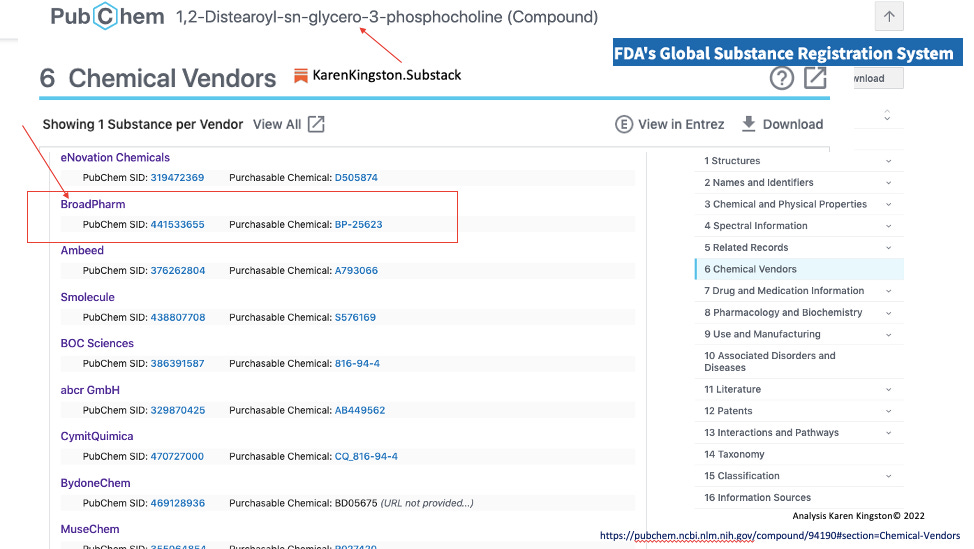
BroadPharm states DSPC is reagent grade, for research purposes only. (This means not for human use).
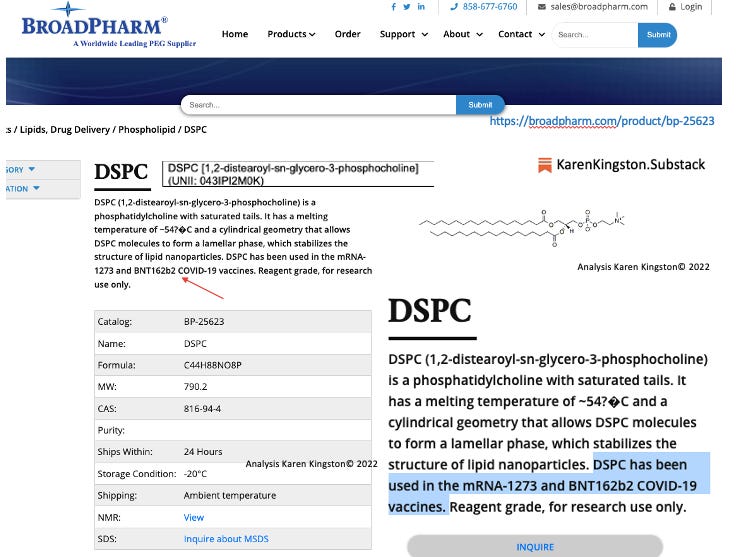
Source – https://karenkingston.substack.com/p/are-lipid-nanoparticles-pfizers-proprietary
